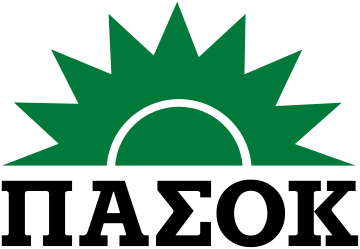Panhellenic Socialist Movement: Difference between revisions
No edit summary Tag: Visual edit |
No edit summary Tag: Visual edit: Switched |
||
| Line 2: | Line 2: | ||
'''PASOK''' is a social democratic party in Greece. | '''PASOK''' is a social democratic party in Greece. | ||
== History == | |||
=== Foundation === | |||
Andreas Papandreou founded PASOK along with other anti-Junta resistance members in 1974. | |||
== Governments == | |||
=== Papandreou Governments (1981-1989, 1993-1996) === | |||
PASOK won the 1981 elections by over 48%. | |||
During Papandreou's first two terms, many significant changes happened, even though Greece remained a [[Dictatorship of the bourgeoisie|bourgeois republic]]. Some enterprises were [[Nationalization|nationalized]] during this time and as such, the public sector was expanded. Communists that fought with KKE's side in the Greek Civil War were allowed to return in Greece and received special pensions. A [[Universal healthcare|free and universal healthcare system]] was established during the 80s, whereas living conditions improved, as the purchase power of Greeks increased by 26% during the course of the decade. [[Trade union|Trade unions]] and work counclis also received rights, shops had fixed opening and closing times, and social security was established. Safety and education were also improved during this time. A more progressive taxation was introduced. Finally, parental leave was introduced, albeit in a limited scale. | |||
During this time, Papandreou tried to pull Greece out of NATO and the EU but failed, as the majority of the party supported to remain in both. However, he did challenge the US imperialist narrative and somewhat de-puppetize Greece.<ref name=":13">{{Web citation|author=John C. Loulis|newspaper=Foreign Affairs Magazine|title=Papandreou's Foreign Policy|date=1984-12-01|url=https://web.archive.org/web/20081029202002/http://www.foreignaffairs.org/19841201faessay8413/john-c-loulis/papandreou-s-foreign-policy.html|archive-url=http://www.foreignaffairs.org/19841201faessay8413/john-c-loulis/papandreou-s-foreign-policy.html|archive-date=2008-10-29|retrieved=2014-02-23}}</ref> He also condemned [[State of Israel|"Israel"]]'s policies in the occupied [[State of Palestine|Palestinian]] territories. However, he supported a two-state solution and not an entirely free Palestine.<ref name=":14">{{Web citation|author=Spyros Kaminaris|newspaper=Middle East Review of International Affairs|title=Greece and the Middle East|date=1999-06|url=https://web.archive.org/web/20120201100748/http://meria.idc.ac.il/journal/1999/issue2/jv3n2a4.html|archive-url=http://meria.idc.ac.il/journal/1999/issue2/jv3n2a4.html|archive-date=2012-02-01}}</ref> | |||
Andreas Papandreou got re-elected in 1993, but passed away in 1996 and got succeeded by the new president of PASOK, Costas Simitis. | |||
=== Simitis Governments (1996-2004) === | |||
During Simitis, while infrastructure was upgraded (the so-called "Modernization"), Greece adopted the Euro as official currency and abolished the Drachma in 2001-02, causing a big rise in prices and crippling the purchase power of Greek citizens. | |||
In 1997, the International Olympic Committee selected Athens to organize the 2004 Summer Olympics. | |||
== References == | |||
[[Category:Social democratic parties]] | [[Category:Social democratic parties]] | ||
[[Category:Imperialist political parties]] | [[Category:Imperialist political parties]] | ||
Revision as of 16:47, 10 January 2024
Panhellenic Socialist Movement Πανελλήνιο Σοσιαλιστικό Κίνημα | |
|---|---|
 | |
| Abbreviation | PASOK |
| President | Nikos Androulakis |
| Founder | Andreas Papandreou |
| Founded | 3 September 1974 |
| Political orientation | Social Democracy Imperialism |
| Political position | Centre-left |
| National affiliation | Panhellenic Socialist Movement - Movement for Change |
| Colours | Green |
| Anthem | Ο ήλιος ο πράσινος (The green sun) |
PASOK is a social democratic party in Greece.
History
Foundation
Andreas Papandreou founded PASOK along with other anti-Junta resistance members in 1974.
Governments
Papandreou Governments (1981-1989, 1993-1996)
PASOK won the 1981 elections by over 48%.
During Papandreou's first two terms, many significant changes happened, even though Greece remained a bourgeois republic. Some enterprises were nationalized during this time and as such, the public sector was expanded. Communists that fought with KKE's side in the Greek Civil War were allowed to return in Greece and received special pensions. A free and universal healthcare system was established during the 80s, whereas living conditions improved, as the purchase power of Greeks increased by 26% during the course of the decade. Trade unions and work counclis also received rights, shops had fixed opening and closing times, and social security was established. Safety and education were also improved during this time. A more progressive taxation was introduced. Finally, parental leave was introduced, albeit in a limited scale.
During this time, Papandreou tried to pull Greece out of NATO and the EU but failed, as the majority of the party supported to remain in both. However, he did challenge the US imperialist narrative and somewhat de-puppetize Greece.[1] He also condemned "Israel"'s policies in the occupied Palestinian territories. However, he supported a two-state solution and not an entirely free Palestine.[2]
Andreas Papandreou got re-elected in 1993, but passed away in 1996 and got succeeded by the new president of PASOK, Costas Simitis.
Simitis Governments (1996-2004)
During Simitis, while infrastructure was upgraded (the so-called "Modernization"), Greece adopted the Euro as official currency and abolished the Drachma in 2001-02, causing a big rise in prices and crippling the purchase power of Greek citizens.
In 1997, the International Olympic Committee selected Athens to organize the 2004 Summer Olympics.
References
- ↑ John C. Loulis (1984-12-01). "Papandreou's Foreign Policy" Foreign Affairs Magazine. Archived from the original on 2008-10-29. Retrieved 2014-02-23.
- ↑ Spyros Kaminaris (1999-06). "Greece and the Middle East" Middle East Review of International Affairs. Archived from the original on 2012-02-01.